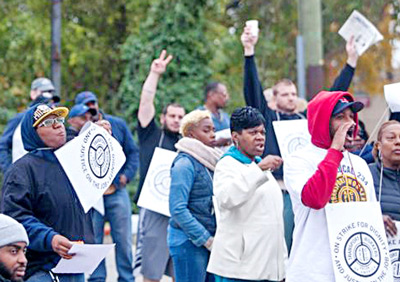
Vol. 80/No. 44 November 21, 2016
(front page)
Philly transit strikers return to work after tentative contract deal

After transit bosses refused to back off concession demands on health care, pensions, safety and wages, the union representing operators and maintenance workers struck Nov. 1, halting buses, subways and trolleys across the city. SEPTA is the sixth largest public transit system in the country.
SEPTA managers and Democratic Party city and state politicians tried to turn working-class sentiment against the strikers, complaining their strike would make it harder for workers to vote Nov. 8. Hillary Clinton was locked in a tight race in Pennsylvania, seeking to turn out a big vote in Philadelphia to offset Donald Trump’s support in other parts of the state.
Clinton held a final rally on election eve featuring Bill and Chelsea Clinton, Barack and Michelle Obama, Bruce Springsteen and Bon Jovi.
“They want to make the election bigger than the strike,” a bus operator called Brother Bernie told the Militant at the Midvale Bus Depot Nov. 6.
“The lesson is to fight for what you want and not back down,” operator Samill Peterson said. “We ask for your support and we will support all who fight.”
Bosses requested an injunction Nov. 4 in Philadelphia Common Pleas Court seeking to end the strike, which they called a “clear and present danger” to the public’s health, safety and welfare. They said the strike would keep children from school, stifle medical treatment and disenfranchise voters. Democratic Gov. Tom Wolf said he would file an amicus brief in support. The Democratic city administration filed a second motion demanding an injunction to force strikers back to work on election day.
Prominent Democratic “friends of labor” — including Mayor Jim Kenney, City Council President Darrell Clarke and U.S. Rep. Bob Brady, a former Carpenters union official — pressed for the strike to end before the election.
A compliant media joined the anti-union campaign, blaming the strike for every conceivable social problem. Philadelphia Inquirer headlines included “SEPTA Strike Makes Methadone Clinics Scramble” and “Philly High Schools Bearing Brunt of SEPTA Strike.”
Strikers and their supporters blame SEPTA and its drive to wring concessions from workers for the stoppage. They saw the strike as a necessary form of struggle to beat back the bosses’ attacks.
SEPTA argued that it had a “defined pool of money” available for the new contract, saying the union must accept that and choose which of their demands to cut.
The company demanded an increase of $352 a month in what transit workers have to pay for health care.
Strikers patiently explained the difficult working conditions that they face every day and seek to change, including only nine hours recovery time between shifts, an inadequate five-minute break between bus runs, and only 10 minutes to report in and conduct a safety check on their bus.
“This has to change,” said driver Peterson. “This is a serious fatigue and safety issue, including for the riders.”
One issue that particularly galled strikers was that their pensions are capped while managers’ pensions are not.
Socialist Workers Party vice presidential candidate Osborne Hart walked the picket lines with TWU members at several locations. “SEPTA went right to the courts to try and break the strike,” he told strikers Nov. 6. “The bosses do everything they can to slander workers who go on strike, to paint us as greedy and selfish, and to get the courts and cops to limit the effectiveness of our strikes. This injunction is not just about SEPTA and the union here, but what faces unionists everywhere.
“The bosses and their politicians want to weaken and bust our unions, which are the front-line defense organizations of the working class,” Hart said. “They fear our capacity to fight, to gain solidarity and to win.”
Chris Hoeppner contributed to this article.
Related articles:
On The Picket Line
Front page (for this issue) | Home | Text-version home